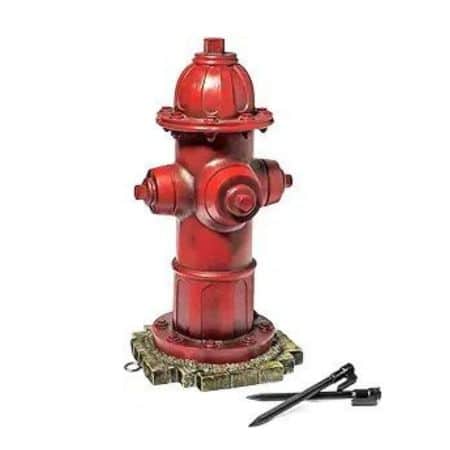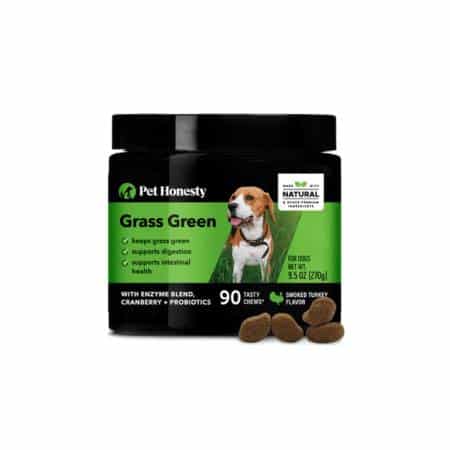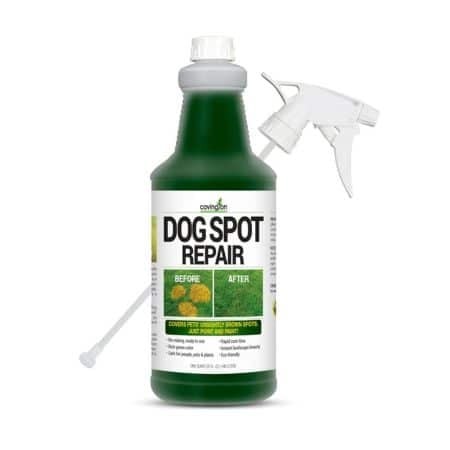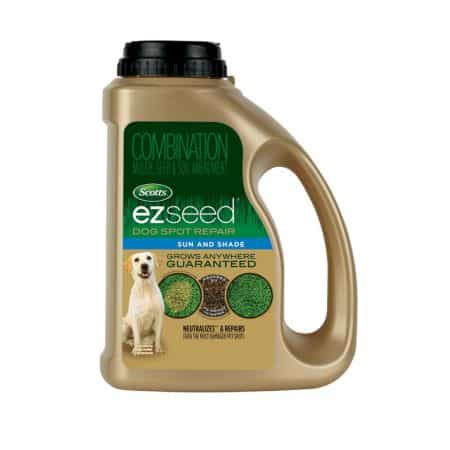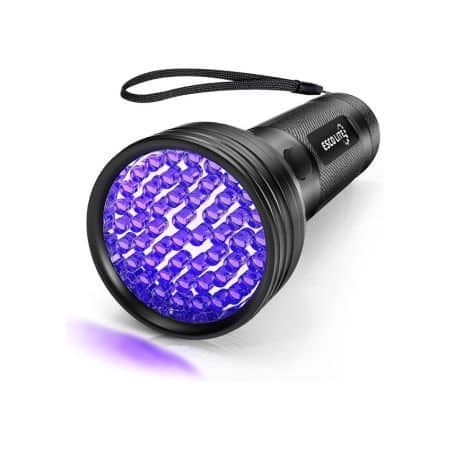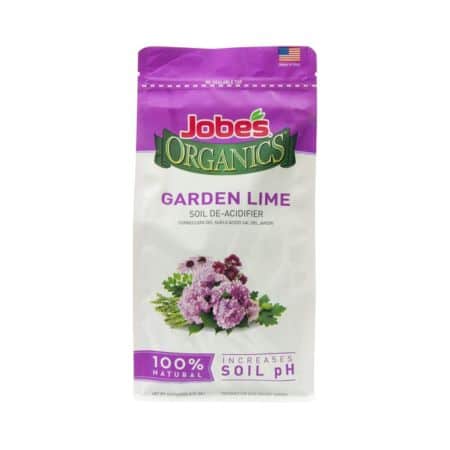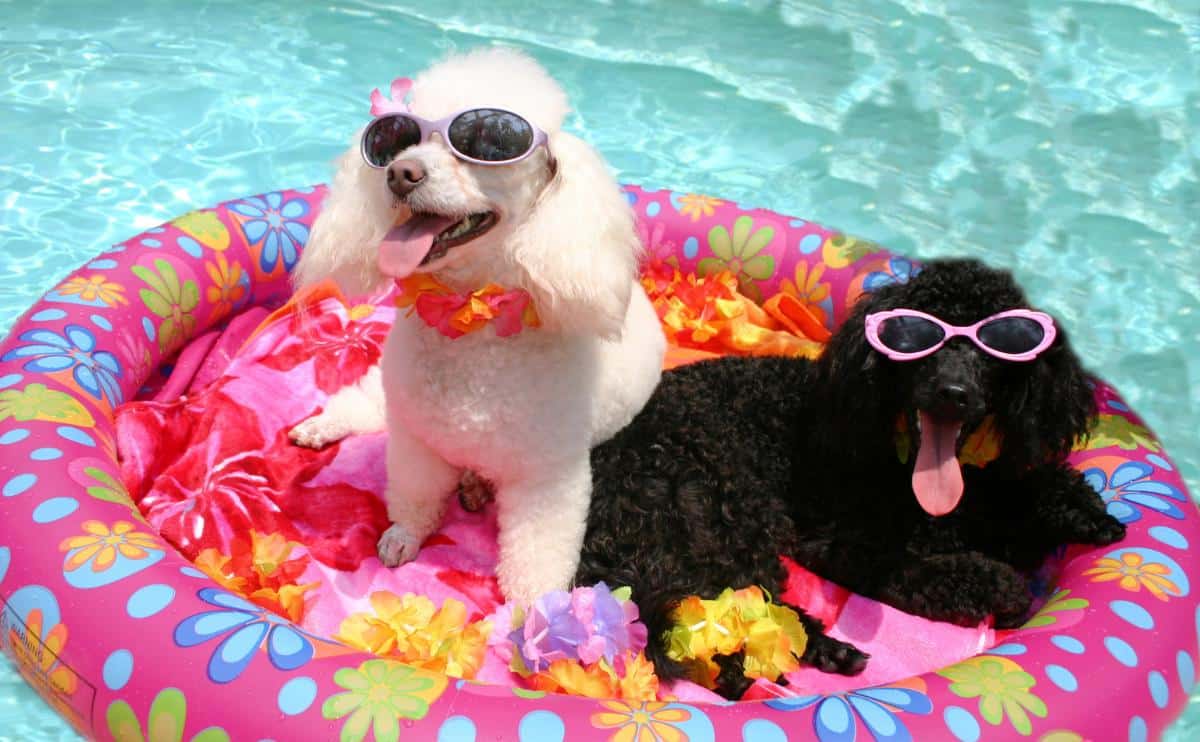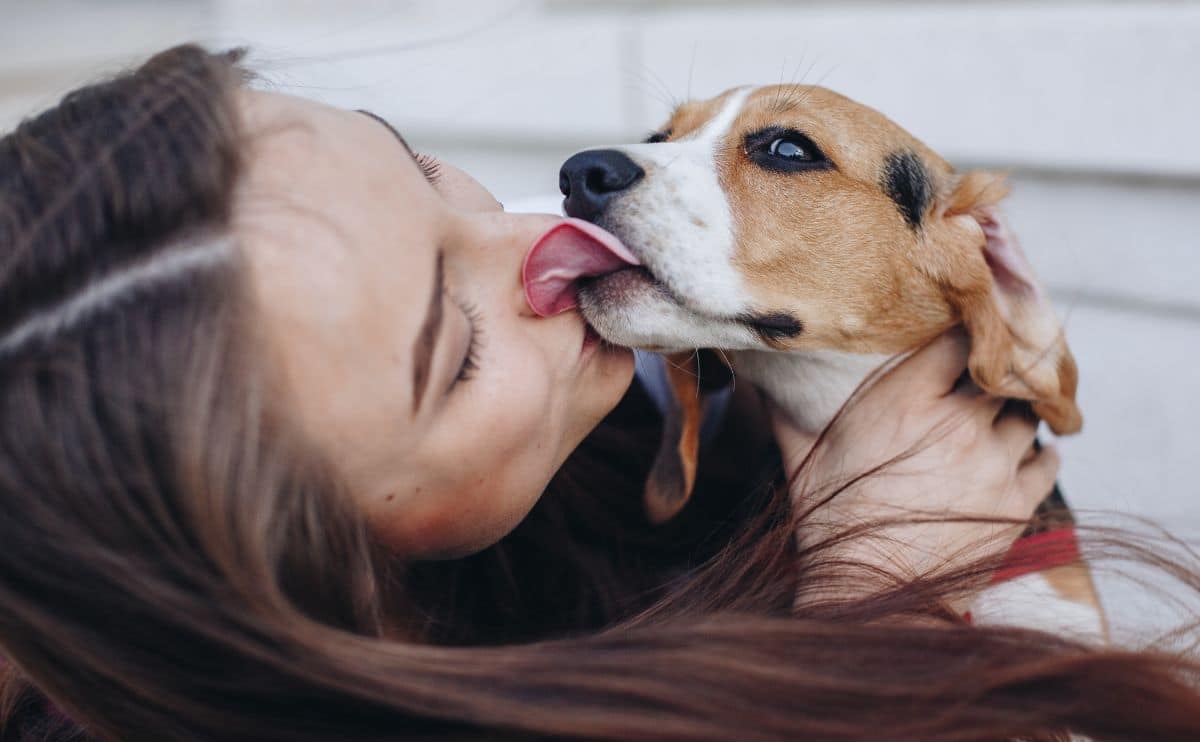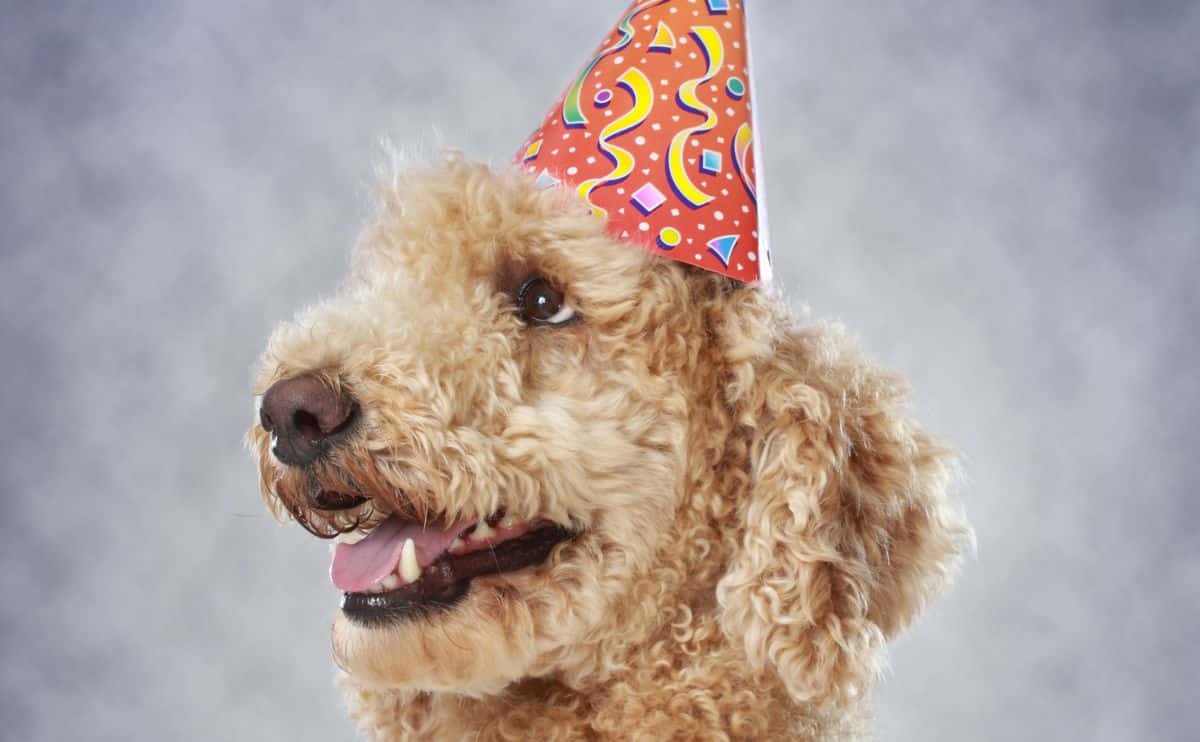Is Dog Urine Killing Grass in Your Yard? Here’s What Finally Worked for Us
When you purchase through links on our site, we may earn a commission. Here’s how it works.
Is dog urine killing your grass? Oh yeah, it’s personal now. One minute, your yard is your pride and joy; the next, it looks like your dog declared war on it… one squat at a time.
Table of Contents
If your pup leaves a trail of yellow “love notes” all over your lawn, rest assured many dog parents are in the same muddy, smelly boat. The struggle is real but fixable. With a few simple tricks (and zero judgment for your four-legged friend), we’ll show you how to save your grass, ditch the smell, and turn your backyard back into a place you actually want to hang out.
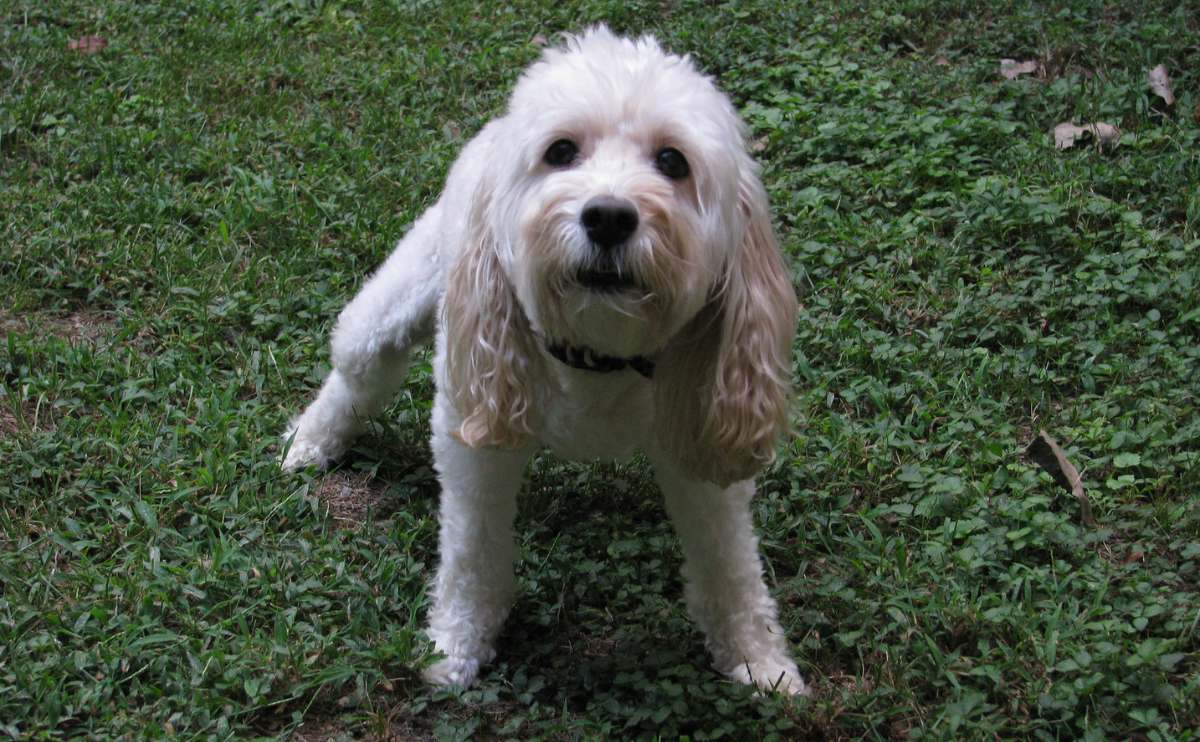
Why Does Dog Pee Kill Grass? The Surprisingly Explosive Truth About Fido’s Fire Pee
Dog urine is basically lawn napalm. It’s not your dog’s fault. Blame the biology.
Dog urine damages grass because it throws off the natural balance of your lawn’s ecosystem. Here’s what’s happening under the surface:
- Dogs’ carnivorous, protein-rich diets create pee that’s loaded with nitrogen. A little nitrogen? Great for grass. Too much in one spot? It’s like over-fertilizing with a blowtorch. That’s why your lawn ends up looking like it caught fire in random polka dots.
- Dog urine tends to be slightly acidic. While pH alone isn’t usually the main culprit, repeated exposure can weaken your lawn’s ability to recover — especially in already compacted or dry soil
- Female dogs often do more damage than males. Not because they’re meaner but because they squat and let it all go in one go. Boys usually spread the wealth while they strut around, marking trees, fences, and your favorite garden gnome.
- And the smell? That’s ammonia. It hits you strongest when fresh, but even dried dog pee can leave a “what died here?” vibe that lingers for months, especially after it rains.
- Along with leaving unsightly urine spots in the grass, dog pee leaves lasting impacts on the ground soil.
Soil Saturation
When your dog pees in the same place day after day, the soil becomes overloaded. This disrupts the grass’s natural ability to absorb nutrients and water. The result: dead, yellow patches surrounded by extra-green edges. Over time, ammonia from the pee can linger in the soil and further stress the grass.
Can You Really Stop Dog Urine Killing Grass?
Yes, if you know what to do. From smarter training to grass-safe products and quick DIY fixes, stopping dog urine from killing your lawn is totally possible. Start with small changes, and you’ll see big results.
5 Tips To Prevent Dog Urine From Killing Grass
Dog pee killing the grass is a common problem, but there are several things you can try to prevent those unsightly brown and yellow dog urine spots from forming.
1. Leash Up for Lawn Control
Taking your dog out to pee on a leash gives you control. This way, you can keep her from urinating in the same spot every time.
Why it works: Repeated peeing in the same spot causes nitrogen overload, which leads to burnt, yellow grass. A leash helps prevent over-saturation in any one area.
2. Train Your Dog to Use a Designated Pee Zone
Training your dog to go in a designated area can take time but can also save your lawn. It will also help prevent unsightly dog urine spots in the grass. Make it a habit and reward your dog when they use the designated doggy bathroom zone.
You might want to consider creating a pile of gravel as the pee spot or choose an area of the lawn that’s not so visible. You could also put a pee post in your yard, like the Lulind Dog Fire Hydrant Garden Statue or the Simple Solution Pee Post that’s infused with pheromones to attract your dog.
Why it works: Concentrating the urine in one spot keeps the rest of your lawn safe. Using gravel or mulch in the pee zone avoids the nitrogen burn altogether.
3. Hydrate, Hydrate, Hydrate
Drinking more water helps to reduce the concentration of nitrogen in urine. It’s also healthier for your dog. You can try offering multiple water bowls, an automatic dog drinking fountain, or mixing more moisture in their diet.
This can be done through fresh meals, as well as mixing in bone broth or extra water in their food.
Why it works: Diluted urine contains less nitrogen, which means it’s less likely to “burn” your grass.
4. Consider a Grass-Saving Supplement
You might want to consider feeding your dog a dietary supplement that balances the pH and nitrogen in urine, like PetHonesty Keep Grass Green Chews or Zesty Paws Stay Green Bites.
These supplements include natural ingredients like cranberry, probiotics, and apple cider vinegar to keep your dog’s digestive system healthy and reduce the amount of nitrogen in your dog’s urine.
Caution: Most of these supplements contain DL-Methionine to neutralize the urine. This ingredient can be harmful to dogs with pre-existing liver and kidney disease.
Why it works: Balanced pH and reduced nitrogen levels = fewer lawn burns. Plus, a healthy digestive system means your dog’s body is processing nutrients more efficiently, which can reduce the harsh effects of urine on grass.
Our Personal Experience With A Loveable Lawn Wrecker
Our dog Barley has the WORST smelling pee of any dog we have ever had! Our yard was starting to smell pretty bad, quickly. The only things I could find online were to water the yard more to dilute and wash it away and to add lava rocks to the dog water. Most other options are not natural and less appealing…plus they don’t get the best reviews.
But we found PetHonesty Keep Grass Green Chews which include probiotics, and it has worked great! We have been using it for four months now, and we no longer have a smelly yard plus our grass is staying green and healthy.
– Michelle Schenker, Rescue Dog Parent & Canine Journal Co-founder
Full Pet Honesty Review
View our full Pet Honesty Review to learn more about their different supplement options.
5. Rinse and Rescue: Spray the Spot
Although not as practical, you can also spray water on the area right after your dog pees. This can help dilute the higher concentration of nitrogen on the grass. Keep a hose or watering can nearby if possible. Even a quick splash helps.
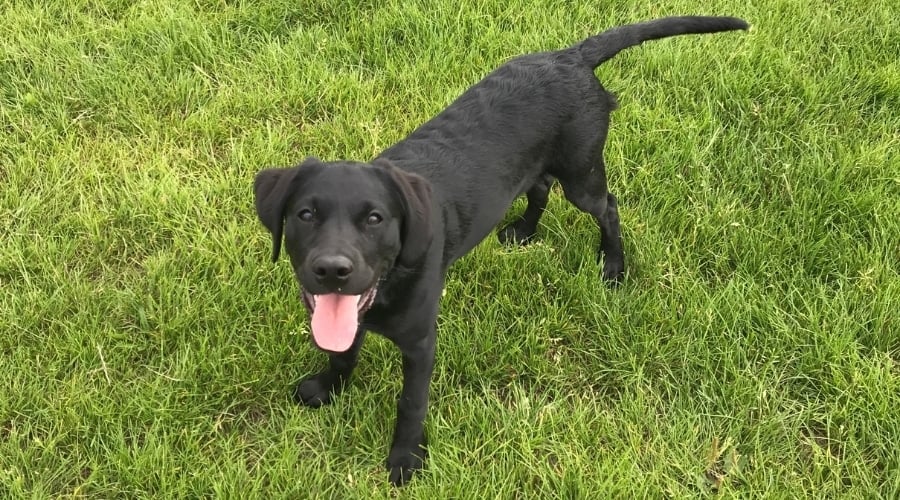
Why it works: Water dilutes the nitrogen before it can burn your grass. It’s one of the simplest, most direct ways to minimize damage, especially if your dog tends to pee in the same spots.
Bottom line: You don’t have to choose between your dog and your lawn. With these simple tips, you can have both: no more patchy grass and no more guilt trips. Just a greener yard and a happier pup.
Myth: Feeding your dog tomato juice or vinegar will neutralize their pee.
Truth: Nope. These old-school remedies can upset your dog’s stomach and won’t stop lawn burn or odor. Learn more about feeding your dog tomato juice and other tomato-based products.
How to Fix Grass Damaged by Dog Urine
Now that you’re working on preventing future damage, it’s time to bring those old brown patches back to life. Whether your yard has a few unsightly spots or looks like a patchwork quilt, these proven fixes can help.
Try Sunday’s Pet Patch for Fast Recovery
We’ve had excellent results using Sunday’s Pet Patch. This product transformed our backyard from a field of dead spots into a lush, green lawn.
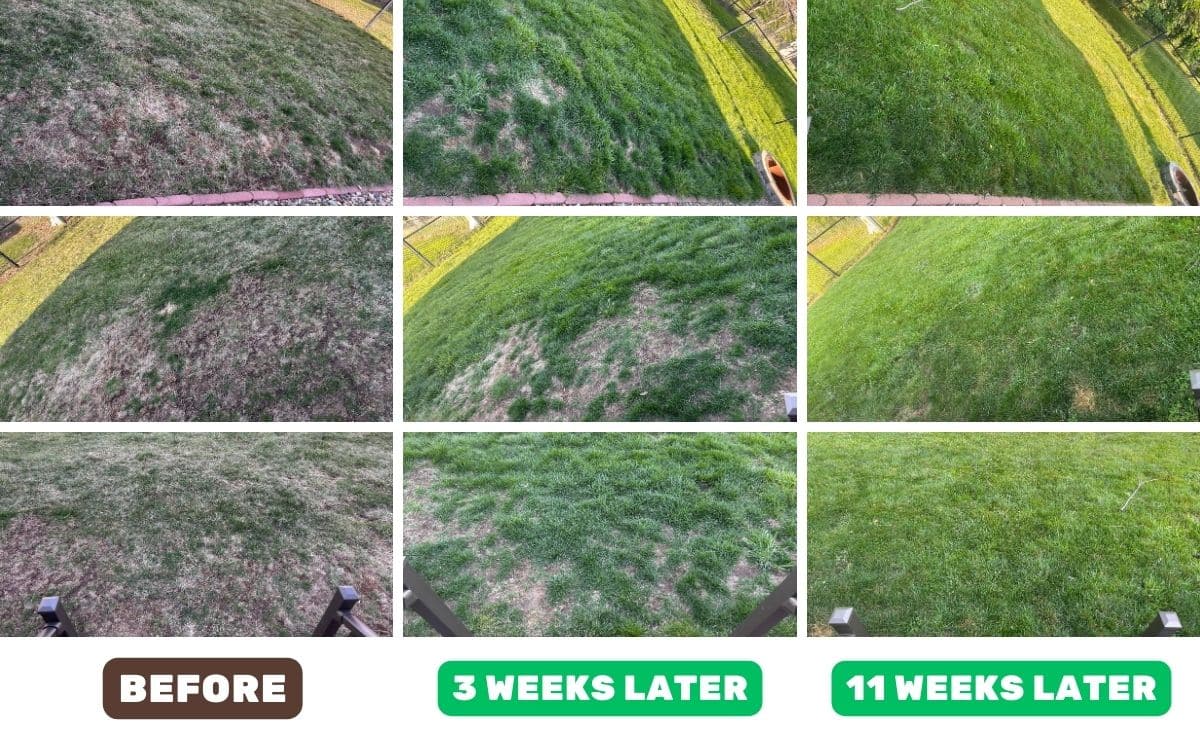
Pet Patch drastically turned a backyard from countless brown spots to vast, lush green grass.
In-Depth Sunday Review
Want to see the complete transformation? Don’t miss our firsthand results and personal experience in our detailed Sunday review.
Use First Saturday Lime to Neutralize Urine Damage
Another highly effective option is First Saturday Lime Insect Repellent. While it’s best known as a pest deterrent, it also has antimicrobial properties and helps neutralize acidic urine, which causes dull, yellow, and dead patches.
When lawn care season came around in 2024, Kimberly Alt (our in-house lawn care expert) tested First Saturday Lime against her dog’s urine spots. Just 17 days after applying First Saturday Lime, the difference was undeniable.
These side-by-side photos taken by Kimberly show visible lawn recovery after just over two weeks.
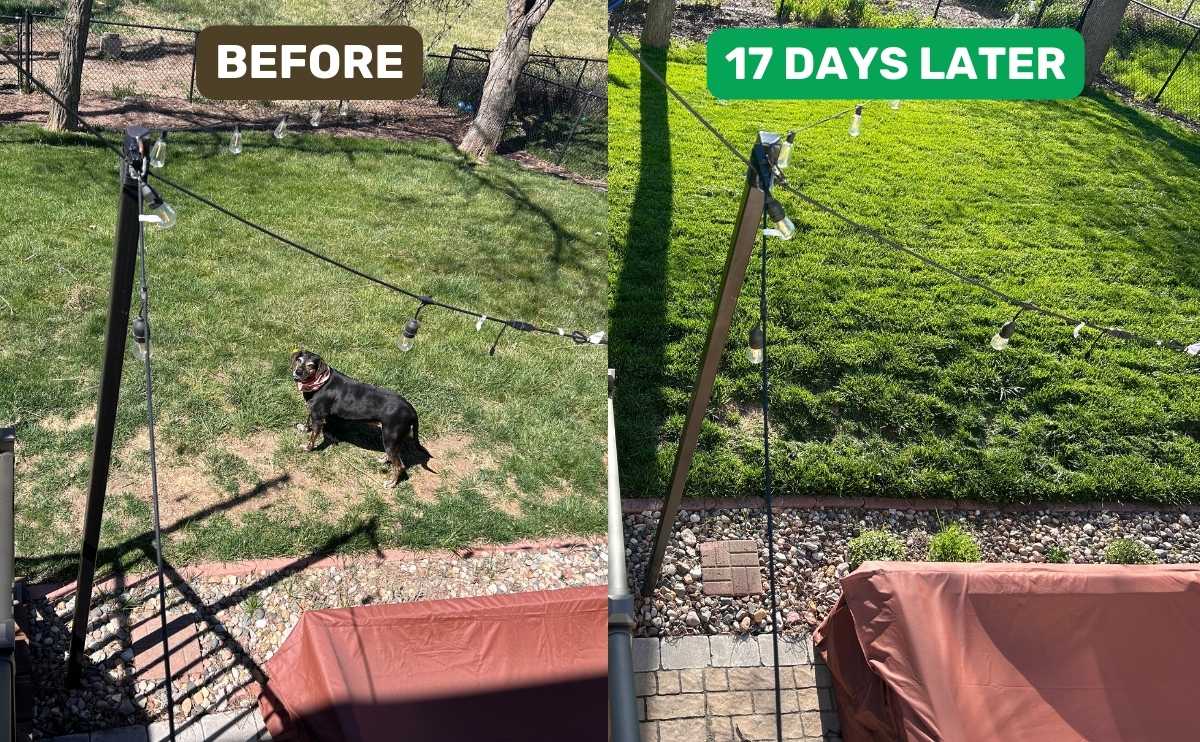
Photo by Kimberly Alt for CanineJournal.com, © Cover Story Media, Inc. 2024.
Kimberly used a scoop to sprinkle a thin layer of First Saturday Lime on the damaged spots on her lawn. You could also use a lawn spreader on the lowest setting and apply one layer across the entire yard.
After applying the insect repellent, she watered the area thoroughly to activate the product.
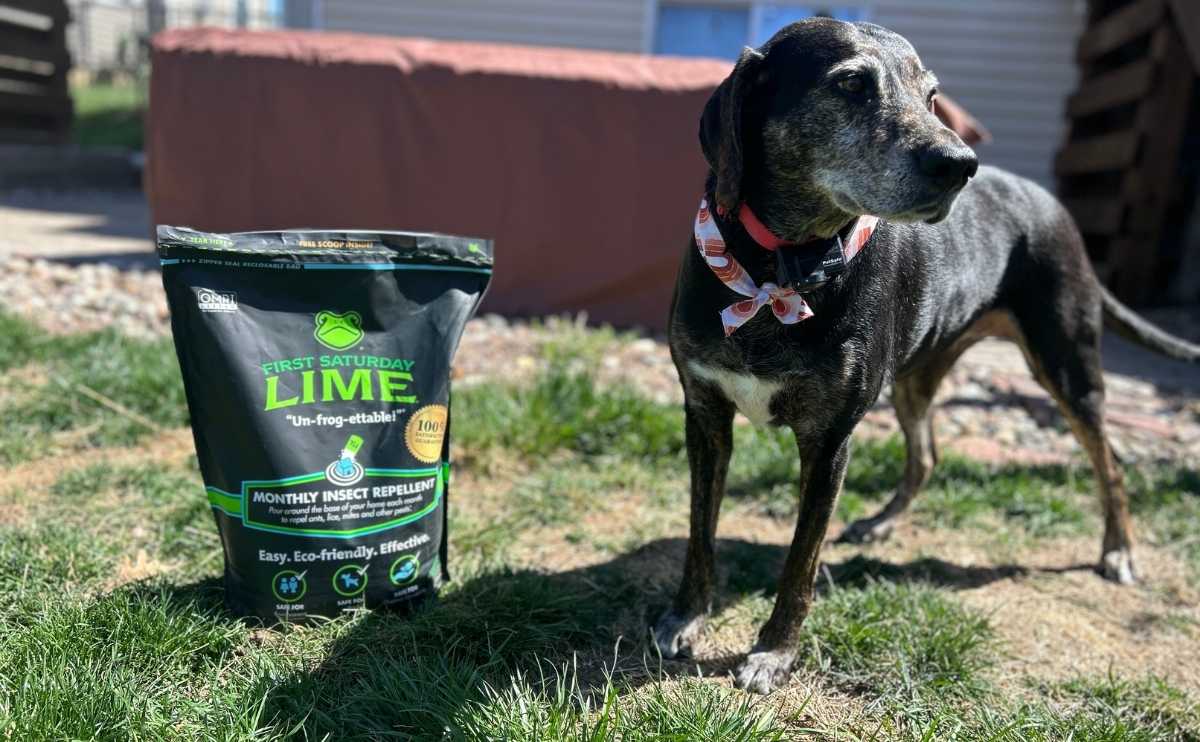
Bonus Lawn Hacks: 3 Extra Tips to Restore a Lush, Green Yard
Once you’ve tackled the worst of the damage with targeted products, there are still a few extra tricks that can help your lawn thrive even faster. These bonus tips will give your grass the boost it needs to grow back thick, green, and resilient.
1. Quick Fix: Lawn-Safe Grass Paint
Hosting a lawn party or putting your home on the market? If you need an instant makeover, Covington’s Dog Spot Repair Grass Paint is a smart, temporary fix.
- Just spray it over the yellowed or dead grass to blend it in with the rest of your lawn.
- One bottle covers about 50–75 square feet.
- It’s safe for kids, pets, and plants, and the color holds up even after rain.
Keep in mind: This is a cosmetic solution, not a cure. But for last-minute touch-ups, it works like a charm.
2. Minor Damage: Patch and Repair
If your lawn has a few trouble spots, patching them up is easy with a repair treatment like Scott’s EZ Seed Dog Spot Repair.
- This product combines grass seed, mulch, and a salt neutralizer to combat urine damage and restore healthy growth from the root up.
- Available in different formulas to match your specific grass type.
- Don’t forget to use a pet-safe fertilizer for ongoing support and to avoid re-burning the grass.
3. Severe Spots: Remove and Replant Grass
When your entire lawn has taken a beating, patching won’t cut it—you may need to start fresh. Here’s how:
- Replant with urine-tolerant grass types like Fescue or Ryegrass.
- Avoid sensitive varieties like Bermuda and Kentucky Bluegrass.
- Consider reducing grassy areas in favor of dog-friendly landscaping:
- Use wood chips, gravel, bark, or artificial turf in high-traffic potty zones.
- Install barriers or fencing to create a dog-free zone for your more delicate grass.
- Incorporate dog-repelling plants like lavender, rosemary, juniper, or Coleus canina (aka the “Scaredy Cat Plant”) to deter marking and digging.
By rethinking your lawn design, you not only protect your yard but create a space that works better for both you and your pup. Work these types of plants into your garden and landscaping to deter not only your dog but also stray cats from peeing in your grass.

Our Real-Life Experience with Dog Pee Lawn Damage
My dog, Sally, likes to relieve herself in the same areas of our yard, completely damaging the grass in those spots. We repaired the areas with Scott’s EZ Seed Dog Spot Repair, and it worked great.
The hardest part was keeping her off those areas while the grass was growing. Until the grass grows back, I’d recommend taking your dog out on a leash to go potty, so all your efforts don’t go to waste.
The thing I like about Scott’s is that it’s easy to know when it needs watering. When the EZ Seed is light brown, it’s time to water.
-Kimberly Alt, Rescue Dog Parent & Canine Journal Writer
How to Get Rid of Dog Pee Smell Outside (Without Losing Your Mind or Your Lawn)
Is the odor of dog pee putting a damper on your outdoor fun? Here are some of our suggestions on how to get rid of dog urine smell outside. The first step to eliminating the dog urine smell outdoors is to locate the source(s). If stains aren’t visible, using a blacklight at night can help you spot where the urine is.
Enzymatic Cleansers
Enzymatic cleaning products, like the highly-rated Simple Green Outdoor Odor Eliminator, work by using natural microorganisms (“good” bacteria) to break down the bacteria in the urine that cause odors and stains.
Simple Green is non-toxic and is safe for use on grass, artificial turf, gravel, concrete, brick, and many other surfaces. It’s also helpful in removing poop odors outdoors.
Check out this video to see how you can easily rid your yard of pet odors using Simple Green.
6 Natural Home Remedies That Work on Outdoor Urine Smells
If you prefer, you can try a homemade yard odor eliminator.
- For grass, sprinkle garden lime on the area. This helps both to eliminate the odor and neutralize the urine to help restore your grass.
- For grass, use an oscillating sprinkler daily on the affected areas. The water will slowly dilute the urine, so it seeps into the soil.
- For non-grassy surfaces, sprinkle baking soda on the area. Let it sit for an hour so it absorbs the urine smell. For cement areas, use a scrubbing brush to scrub the area before letting it sit. Rinse with fresh water.
- If the urine has dried on a porous surface, like cement, mix bleach with water and pour it over the surface. Allow it to sit for 10 minutes before hosing off the area.
- For wooden surfaces like benches or decks, vinegar may be helpful to remove urine smells. Mix white vinegar with equal parts water and spray down the wood. Rinse the solution off about five to ten minutes later. Repeat if needed.
- You can turn over the soil in your yard. This is a lot of work, so it may be a last resort. If you have areas of the yard that simply smell atrocious, this is a highly effective way to release that urine odor. Spray down the soil once it’s turned over for extra odor-reducing power.
Considering Artificial Turf? Here’s What to Know About Dog Pee Smell
Artificial grass won’t die from dog pee, but it can trap odor if not cleaned properly. If you’re thinking of switching to turf, here’s what you need to keep it fresh:
- Clean Regularly: Hose down pee zones weekly (or more often in hot weather).
- Use Enzymatic Cleaners: Products like Turf Renu or Simple Green Outdoor Odor Eliminator break down the odor-causing bacteria.
- Upgrade Infill: Choose a zeolite-infused or odor-control infill over basic silica sand to neutralize smells at the source.
- Ensure Drainage: Poor drainage = lingering urine and stronger odors. A proper base layer and good airflow are musts.
Artificial turf is low-maintenance but not non-maintenance. If you’re not up for routine rinsing, odors can quickly build up.
Bonus: How to Handle Indoor Dog Pee Stains & Odors
Dog urine killing grass is one problem, but we can’t forget what happens inside the house. Plenty of pet parents struggle with indoor stains as much as outdoor damage. Carpets, rugs, and hardwood floors can trap urine deep in the fibers or flooring, causing lingering smells and repeat accidents.

Here’s a quick breakdown of what works:
- Fresh Accidents: Blot, don’t rub. Then, use a pet-specific enzymatic cleaner like Nature’s Miracle or Rocco & Roxie. Let it sit, then blot or vacuum as needed.
- Old or Dried Stains: Saturate them with an enzyme cleaner and let them sit overnight. For deep cleaning, use a carpet extractor. Follow with baking soda to absorb the leftover odor.
- Hard Floors & Grout: Use enzyme sprays made for sealed or unsealed surfaces. Skip bleach and ammonia. They can set the stain and smell worse to dogs.
For step-by-step help, check out our full guide: How to Get Dog Pee Smell Out of Carpet. We also cover different ways to tackle those pesky pet odors.
Frequently Asked Questions: Dog Pee and Your Lawn
We know there are more questions about dog urine killing grass. There’s a lot of confusion (and some persistent myths) out there. We’ve gathered answers to the most common ones below. And if we missed yours, feel free to drop it in the comments. We’re happy to help.
What type of grass is most resistant to dog urine?
Grasses like Perennial Ryegrass and Tall Fescue tend to be more urine-tolerant. Bermuda and Kentucky Bluegrass are more sensitive and prone to spotting. Choosing the right type for your region and needs can help reduce damage.
How long does it take for grass to recover from urine damage?
Recovery time varies. Light burns can heal within a week or two with watering and reseeding. Severely damaged patches may take 3–6 weeks or require complete replanting, depending on the treatment used.
Should I avoid fertilizing areas where my dog pees?
Yes. Since urine already delivers nitrogen, adding fertilizer can double the dose and worsen the burn. Skip fertilizing in high-traffic potty areas or use a low-nitrogen formula. If you want a little more guidance, we have a full review of the best pet-safe lawn fertilizers as well as pet-safe weed killers.
What’s the fastest way to fix a dog urine burn spot on my grass?
The quickest fix is applying lawn-safe grass paint for immediate cosmetic improvement. For actual repair, use a product like EZ Seed Dog Spot Repair, which includes seed, mulch, and a neutralizer—results can be visible in 1–3 weeks with proper watering.
Can I prevent lawn burn by changing my dog’s diet?
Sometimes. Diets lower in protein or with added moisture (like wet food or broth) can result in less nitrogen in urine. However, your vet should approve any changes, especially for dogs with special dietary needs. Hydration plays a bigger role than food alone. Yes, dog urine killing grass is a concern, but your pup’s health comes first.
When Strong-Smelling Dog Urine Means Something More
If your dog’s urine has a strong, foul, or unusual odor, especially one that smells fishy, sour, or ammonia-like, it might be more than just a lawn problem. While most grass damage is caused by concentrated nitrogen in healthy urine, a sudden change in smell or frequency could signal a medical issue. Conditions like urinary tract infections (UTIs), bladder stones, kidney disease, or dehydration can all impact the odor and composition of your dog’s pee.
If your pup is showing additional signs, like peeing more frequently, having accidents indoors, licking their urinary area, or if you notice blood in the urine, it’s best to consult your vet promptly. Not only will you help your dog stay healthy, but addressing these issues may also help reduce the risk of dog urine killing grass and keep your lawn (and your pup) in better shape for the long run.
